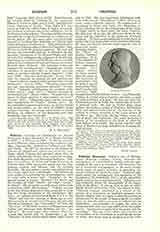

Politian (ANGIOLO DE ‘AMBROSINI DA MONTE PULCIANO), Italian Humanist, b. at Monte Pulciano in 1454; d. at Florence in 1494. At the age of ten he went to Florence, where he followed the courses of Landino, Argyropoulos, Andronicus Callistus, and Marsilio Ficino. In 1477 he was tutor to the children of Lorenzo the Magnificent, and became one of the Accademia which Lorenzo had grouped about him, in which, with Marsilio Ficino, were associated Landino, Pico della Mirandola, and Hermolaus Barbarus. Politian was professor of Greek and Latin literature at Florence from 1480; among his pupils were the Englishmen, Grocyn and Linacre, and the German Reuchlin. He was rather a master and interpreter of the ancient spirit than a philologist. His lessons on each author were preceded by an introduction, often in verse, with a poetic title: “Nutritia” for the general eulogy of poetry, “Rusticus” for Hesiod and the Georgics of Virgil, “Manto” for Virgil, “Ambra” for Homer. His discourses or preliminary poems form a collection called “Prwlectiones”. Politian was one of the first Italian Humanists who succeeded in rivalling the Greek scholarship of the native-born Hellenes. At eighteen he translated Books I to V. of the “Iliad” and won the surname of Homericus juvenis. Subsequently he translated Callimacus, the historian Herodien, Epictetus, the “Charmides” of Plato, the “Eroticus” of Plutarch, treatises of Hippocrates and Galian, and selections from Moschus and the “Anthology”. He read many other authors, which for a long time existed only in manuscript, e.g., the “Months” of John Lydus which Schow made known only in 1794. His most important philological work is his collection of “Miscellanea” (1489), wherein he treats various scholarly subjects; the employment of breathings in Greek and Latin, the chronology of Cicero’s familiar letters, the orthography of the name of Virgil, which he fixed under the form Vergilius, the discovery of purple, the difference between the aorist and the imperfect in the signature of Greek sculptors. He was a modern philologist in his efforts to recover the best manuscripts and to procure collations. He thus contributed towards improving the text or preserved intact the Latin elegiacs, the “Silv” of Statius, Terence, Lucretius, Ovid, Celsus, Quintilian, Festus, Ausonius, the agricultural treatises. T h e critical editions of these authors place his name in the history of manuscripts, but he made a special study of the “Pandects” on the sixth century MSS. brought from Pisa to Florence in 1411. As a Humanist, Politian is a Latin writer of poetry and prose, a poet of Latin sentiment in Italian. He does not share the Ciceronian purity of Valla, but endeavors to create a personal style. He had to defend these ideas against the Latin secretary of Florence, Bartolomeo Scala and against Paolo Cortesi. He was one of the earliest to attract attention to the Latin writers of the Silver Age. His Latin, like his Italian, verses are full of grace and sentiment. He wrote in Latin a history of the conspiracy of the Pazzi in which he took Sallust as a model. His letters together with those of Bembo were long considered as realizing the ideal of style.
PAUL LEJAY

